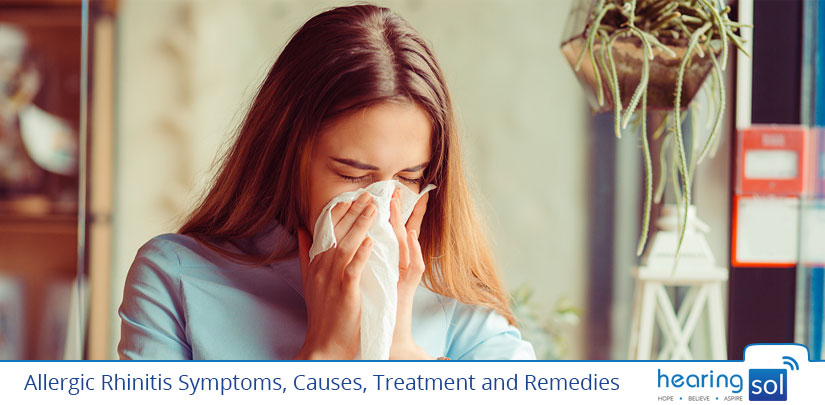
It is a type of inflammation in the nose due to an allergic reaction to airborne allergens like seasonal grass or ragweed pollen, or year-round allergens like dust and animal dander. It is sometimes also called ‘hay fever’.
Hay fever generally caused by seasonal allergens. It shares many of the same symptoms as a common cold, but which is not caused by a virus or bacteria, rather it is caused by the person’s immune system reacting to allergens that are inhaled through the nasal and into the body.
If you need any assistance or have a question about Allergic Rhinitis, you can consult our HearingSol experts with your problem, feel free to call us on +91-9327901950. We are always here to help you.
Despite the name, hay fever is not necessarily a reaction to hay nor does it cause fever. Usually, it develops when the body’s immune system becomes sensitized and then starts to overreact to something that is present in the environment. However, this typically does not cause any problems in people.
Now it’s time to discuss all related terms of Allergic Rhinitis.
Allergic Rhinitis Symptoms
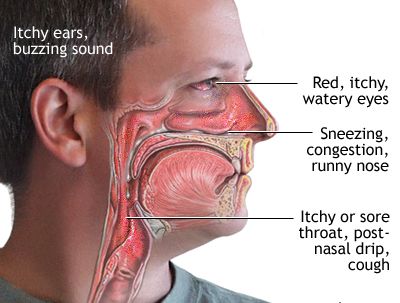
The most common symptoms of allergic rhinitis or hay fever usually include:
- Stuffy nose (due to blockage or congestion)
- A runny nose
- Sneezing
- A cough
- Inflammation of the mucous membrane
- Itchy eyes, throat, mouth or skin
- Redness
- Swollen eyelids
- Swelling of tissues
- Fatigue (due to poor sleep)
Causes Of Allergic Rhinitis
Allergic rhinitis may also take the form of a chronic respiratory condition that is marked by sneezing, a runny and itchy nose and eyes.
It is mainly caused by breathing in microscopic particles of specific allergens or some air-borne substances to which an individual is sensitive or allergic.
-
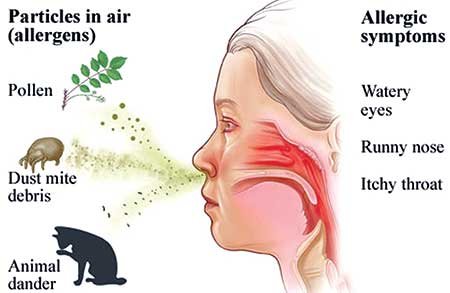
- Allergic rhinitis causes
Individuals with allergic rhinitis if breathes substances like the microscopic particles that are present in the environment in the form of pollen, mold, dust mites, dead skin of animals, or feathers of birds have possible chances of triggering an abnormal reaction of the immune system.
As such, the affected individual’s immune systems start reacting to these substances, which often leads to release chemicals, including histamine.
Although uncomplicated allergic rhinitis may not be a serious condition, it can trigger or accompany a serious, maybe fatal attacks of shortness of breath and wheezing sound in individuals who may already be suffering from asthma, or other respiratory problems.
It can also affect people who generally suffer from eczema, sinusitis, and otitis media. Children with asthma are at a higher risk for rhinitis.
Types Of Allergic Rhinitis
Allergic rhinitis can be classified into two different types, namely:
- Seasonal Allergic Rhinitis
- Perennial Allergic Rhinitis
1. Seasonal Allergic Rhinitis
As the name suggests, the symptoms of seasonal allergic rhinitis usually in individuals during specific seasons like spring, summer, and autumn (or fall).
Allergic sensitivity to airborne mold spores, or to pollens from various grass, trees, and weeds are some causes that enhance the symptoms.
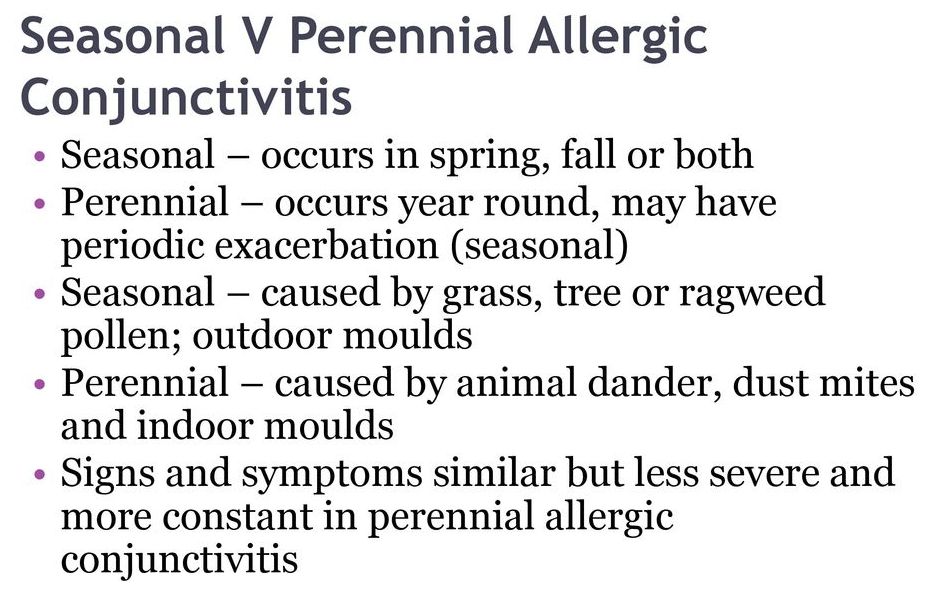
2. Perennial Allergic Rhinitis
The symptoms of perennial allergic rhinitis occur throughout the year. It is usually caused by dust mites, pet hair, or dead skin (dander), cockroaches, or mold. Apart from these, underlying or hidden food allergies rarely cause perennial nasal symptoms.
However, some individuals may experience both seasonal and perennial allergic rhinitis, with the symptoms of perennial becoming worse, especially during pollen seasons.
Diagnosis Of Allergic Rhinitis
The diagnosis of allergic rhinitis condition is carried out through obtaining an accurate history of the individual’s health, including symptoms and performing physical tests.
However, for some people, an allergy test may be performed that usually follows a skin patch test procedure.
In this type of skin patch test, small amounts of common allergens are applied methodically to the skin in order to determine the substances that triggered the allergic response, which ultimately led to allergic rhinitis.
In addition to this, a certain test like a complete blood count (CBC) and other related blood tests may also be carried out.
Treatment Of Allergic Rhinitis
At present, there is, unfortunately, no cure for allergic rhinitis, however, there are chances the condition can be controlled with an effective treatment plan at a health-care institution.
Upon properly going through the individual’s personal medical history, reaction to specific substances, and the frequency and severity of the symptoms, the treatment may include preventive measures as well as oral medications in order to control the symptoms.
The first and best option is to avoid contact with substances that trigger your nasal allergies. When prevention is not enough, consider using over-the-counter or prescription medicines.
The following are the treatments that can be used to treat allergic rhinitis.
A) Medicines For Allergic Rhinitis
- Antihistamines – This can be taken in both the ways either by mouth or as a nasal spray. They help in relief from sneezing and itching in the nose and eyes. It also helps in reducing the runny and, to a lesser extent, nasal stuffiness.
- Decongestants – This medicine is also can be taken in both ways either by mouth or as a nasal spray. It helps in shrinking the lining of the nasal passages which relieves nasal stuffiness.
- Nasal Corticosteroids – This medicine is used in nasal spray form. It reduces inflammation in the nose and blocks allergic reactions. This is one of the most effective medicine types for allergic rhinitis because it can reduce all symptoms, including nasal congestion.
- Cromolyn Sodium – This is a nasal spray that stops the discharge of chemicals that cause allergy symptoms, including histamine and leukotrienes. This medicine has few side effects, but you must take it four times a day.
B) Allergic Rhinitis Homeopathic Treatment
There are various reasons why to treat rhinitis using homeopathy:
- All allergy patients experience their allergy in apart ways. It offers an individualized mode of therapy to the patient.
- There may be unbearable itching in the palate, the ears, the throat, the eyes, or a combination of any of these. Rather than offering blanket suppression of symptoms, the homeopath selects a matching medicine for the symptom or allergy picture of the patient.
- There is no requirement for continuous treatment. Usually, a short course at the starting of the hay fever season or a few doses of medicine might give you relief for weeks or even months at a time.
- Homeopathic medicines are free from the sedative side effects of conventional antihistamine therapy.
C) Allergic Rhinitis Ayurvedic Treatment
Vata-Kaphaja pratishaya is the name of Allergic rhinitis under Ayurveda. The concept of Ama, Asatmya, and virudh aahara also predicts allergic conditions. Here are some ayurvedic medicines that have some incredible results, according to a study:
- Nimbarajanyadi tablet – It Contains neem and turmeric as the main ingredients.
- Chavikasavam – The use of chavikasavam is in urinary tract disorders. It is a Fermented Ayurvedic liquid.
- Mahalaxmi Vilas Ras – It is very useful in the treatment of skin diseases, diabetes, sinus, non-healing wounds, etc.
These are the various treatment methods or ways you can choose to treat your allergic rhinitis.
But when it comes to pregnant women, the selection of medicines became hard as these medications can affect the fetus.
Allergic Rhinitis In Pregnancy
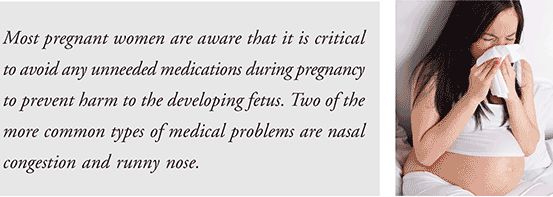
If a woman has had allergic rhinitis before pregnancy, this could worsen and can increase in pregnancy hormones.
A pregnant woman with rhinitis should be concerned about the safety of medications during pregnancy, and therefore avoid taking medications.
These are the various medication that generally prescribed by a doctor for pregnant women
- Nasal salined3
- Antihistamines.
- Medicated nasal sprays.
- Decongestants
These medications can be required if the avoidance of allergic triggers is not successful. These are generally prescribed medicines of rhinitis during pregnancy.
Let’s take a look at the process to treat children with rhinitis.
Allergic Rhinitis In Children
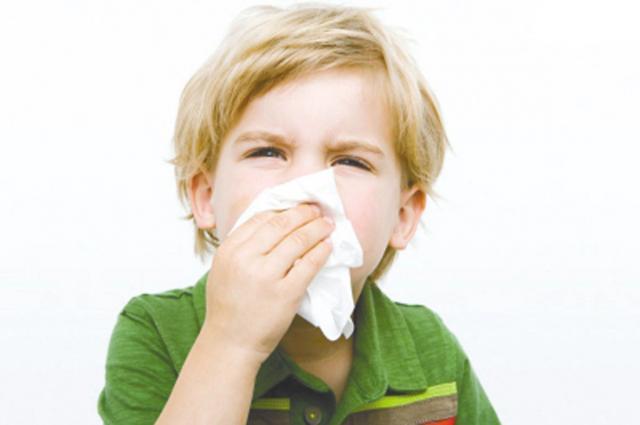
Causes:
- Upper Respiratory Infection: This infection is one of the conditions that can mimic the symptoms of rhinitis in a baby.
- Teething: This can cause an infant to have a runny nose, resulting in the accumulation of mucus and the development of congestion.
- Adenoid Hypertrophy: It is also a common cause of chronic congestion in younger children.
Diagnosis:
If an allergy suspected in a child, the doctor asks to have an allergy test to confirm the diagnosis. The skin test is performed by using a thin needle to inject the diluted allergen into the skin.
It can also be performed by pricking the top layer of the skin with a diluted allergen such as mold or pet dander. It will take around 15 minutes for a result to confirm. A child under 6 months is not eligible for this test.
Prevention Of Allergic Rhinitis
Generally, a professional health practitioner performs treatment of allergic rhinitis, which commonly includes:
- Environmental control measures and allergic avoidance
- Anti-allergic medication (anti-histamines)
- Topical decongestants
- Analgesics
- Systematic anti-histamines
- Antipyretics
- Immunotherapy
- Desensitization
- Intranasal antihistamines
- Oral corticosteroids
- Decongestants
Although it is not a contagious disease. For effective treatment and avoid further complications, immediately seek a Doctor.
Things To Avoid
These are some factors that can make the condition worse and trigger the effect of rhinitis.
- Air Pollution – Try to avoid going on the roads without a pollution mask. As get in contact with pollution make the condition worst.
- Cigarette Smoking – can enhance the symptoms of itchy nose and throat as smoke can directly enter your body via mouth and nose.
- Cold Temperature – Many researchers proved that cold temperature can trigger the condition.
- Perfumes – For some people, these symptoms are caused by an allergic reaction to fragrances, which means the body’s defense against germs overreacts to perfumes.
- Wood smoke – Smoke from wood fires contains gases and particles that can cause difficulty in breathing and can have a worse effect on the immune system.
- Pollen – Stay indoors when pollen counts are at their peak especially when the wind is blowing pollens around.
- Indoor Dust – Try to lower exposure to dust mites, especially in the bedroom. Wash your bedding frequently, using hot water.
Conclusion
Allergic rhinitis is a curable disease if caught early and treated properly otherwise it can worsen up and lead you to many difficulties and various other diseases and problems.
If you found any given symptoms given in this article then do not ignore it, instead, talk to a professional and treat it before it gets worse.
If you need any assistance or have a question about Allergic Rhinitis, you can consult our HearingSol experts with your problem, feel free to call us on +91-9327901950. We are always here to help you.

 Reviewed by Mr. Ranjeet Kumar
Sr. Audiologist, Speech Therapist & Cochlear Implant Specialist, BASLP on
Reviewed by Mr. Ranjeet Kumar
Sr. Audiologist, Speech Therapist & Cochlear Implant Specialist, BASLP on